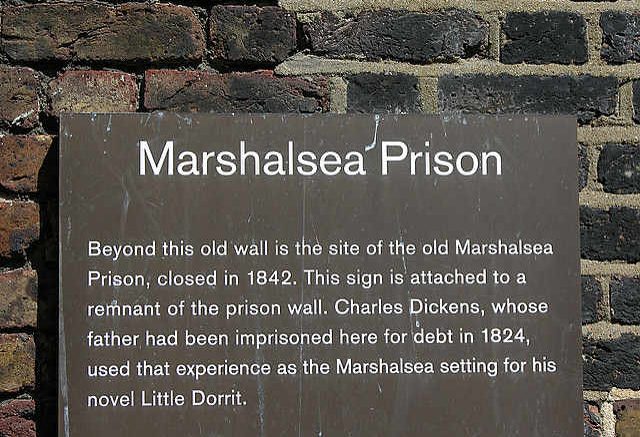MARK KARLIN, EDITOR OF BUZZFLASH AT TRUTHOUT
A wall of Marshalsea Prison, where the father of Charles Dickens was imprisoned for being in debt. (Photo: Hornbeam Arts )
You don’t need to read Charles Dickens to learn about debtors’ prisons. You can just visit Sherwood, Arkansas.
A few months ago the Lawyers’ Committee for Civil Rights Under Law (Lawyers’ Committee), along with Morrison & Foerster LLP and the American Civil Liberties Union of Arkansas (ACLU of Arkansas) filed a class action civil rights lawsuit against Sherwood in federal court. The goal of the legal action is to end the town’s practice of using failure to pay court costs and petty fines as justification for imprisoning people for the “crime” of poverty.
According to a news release by the Lawyer’s Committee:
The suit was filed on behalf of four individuals who allege their constitutional rights were violated by the Hot Check Division of the Sherwood District Court when they were jailed for their inability to pay court fines and fees in violation of longstanding law forbidding the incarceration of people for their failure to pay debts, and a concerned taxpayer.
“The resurgence of debtors prisons across our country has entrapped poor people, too many of whom are African American or minority, in a cycle of escalating debt and unnecessary incarceration,” said Kristen Clarke, president and executive director of the Lawyers’ Committee for Civil Rights Under Law. “The Sherwood District Court epitomizes the criminalization of poverty and the corrupting effect of financial incentives on our local courts. Not only does this ‘Hot Check’ court completely ignore the long-standing principle that a person cannot be punished because they are poor, but by using coercive practices to collect money from the poorest Arkansans, this debtors’ prison scheme generates huge revenues for the city. Revenue from the district court constitutes nearly 12 percent of the city’s budget, second only to city and county sales tax…”
The lawsuit alleges that Sherwood, Pulaski County and their officials engage in a policy and custom of jailing poor individuals who owe court fines, fees and costs stemming from misdemeanor “hot check” convictions with complete disregard for the person’s ability to pay; requiring defendants to waive their right to counsel before entering the courtroom; and closing court proceedings to the public.
The court issues an arrest warrant each time a person fails to make a payment, regardless of their ability to pay, and uses it as an opportunity to assess more fines and fees against the individual.
It’s a system guaranteed to keep poor people in a state of indigence, because if you are incarcerated you can’t pursue a job, secure housing for yourself or work to improve your economic conditions. In fact, those things will be harder to accomplish upon your release.
According to another news release , the Lawyer’s Committee and its co-counsels are arguing that:
According to the Supreme Court of the United States, it is unconstitutional to imprison someone because he or she cannot pay a fine or fee imposed by a court. The idea is that people should not be punished differently because of their financial status…. According to Arkansas law, court-imposed fines and fees can only be enforced and collected after an inquiry into the defendant’s ability to pay those fines and fees and defendants who are unable to pay cannot be incarcerated because of their failure to do so.
Prior to filing the case, the Lawyer’s Committee found that Sherwood violated standing law on several counts:
Defendants are being jailed due to their poverty.
No inquiry made into the defendant’s ability to pay fines and fees imposed.
Defendants who cannot pay the court have a warrant issued for their arrest.
Sherwood Police officers knock on people’s doors and threaten to arrest the person unless they can pay a small amount of money — usually $50 or $100 — to get a court date instead of being taken into custody.
Those who cannot pay are arrested and jailed prior to any court hearing.
Trials and hearings in the Hot Check Division of the Sherwood District Court are not open to the public.
Defendants are required to waive their right to counsel.
Fines and fees paid by defendants are paid to the City of Sherwood District Court, which has made $12 million from this court in the last five years, and to Pulaski County prosecutors and Sheriff’s Office.
The Marshall Project confirms the illegality of debtors’ prisons in the US:
In the United States, debtors’ prisons were banned under federal law in 1833. A century and a half later, in 1983, the Supreme Court affirmed that incarcerating indigent debtors was unconstitutional under the Fourteenth Amendment’s Equal Protection clause. Yet, citizens like Though de jure debtors’ prisons are a thing of the past, de facto debtors’ imprisonment is not. So what do we really know about modern-day debtors’ imprisonment – how it returned, when, and where?
The Marshall Project also confirms that Sherwood, Arkansas, is not an isolated case.
When we picture debtors’ prisons, we need not harken back to the incarceration of Charles Dickens’ father in Victorian England. It is alive and well right here in the United States.
CAReview Editor: The views, opinions and positions expressed within articles by the authors and those providing comments on these blogs are theirs alone, and do not necessarily reflect the views, opinions or positions of ClassActionReview.com. Please review our TOS for additional details. For more information, please visit www.truth-out.org.
Source: www.truth-out.org




